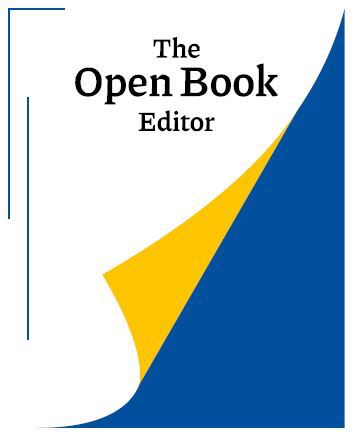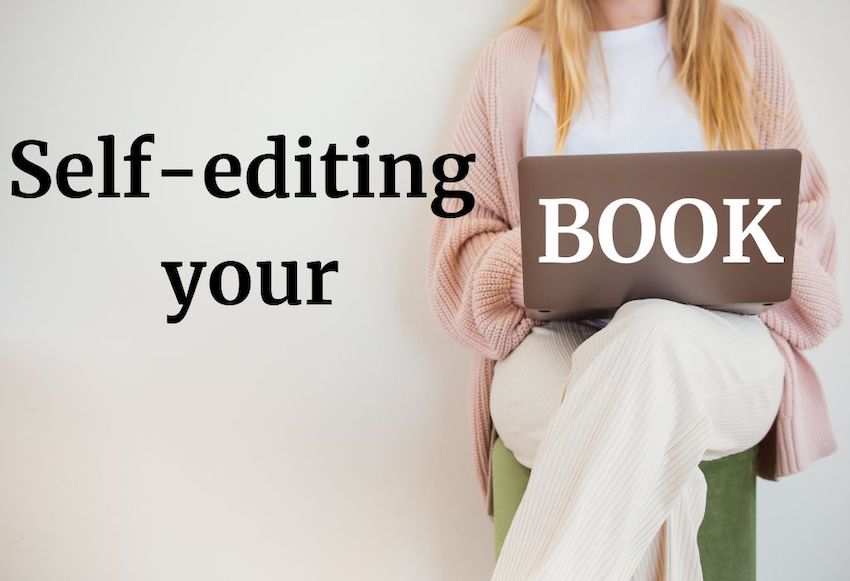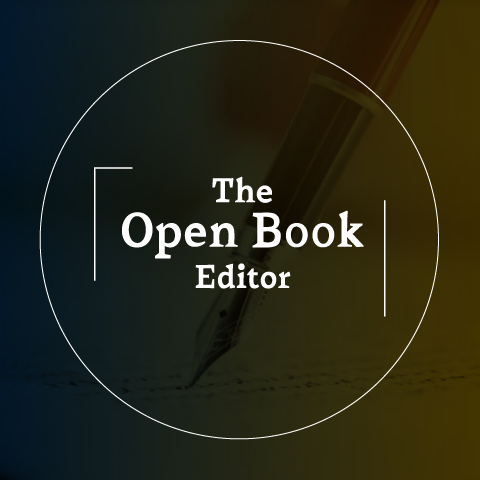Self-editing your book might not be as sexy as creating a new story, crafting incredible characters, and finding the perfect ending. But, self-editing your book is an absolutely essential part of writing and, we’d argue, offers its own rush of satisfaction!
It’s rare for a first draft to be query-ready (let alone publishable). Even the most famous authors self-edit their work extensively before passing it on. But it’s a task that demands attention and organisation.
Are you dreading the self-editing process? You don’t have to! Below, we break down some of the best ways to approach it and major things to watch out for when self-editing your book.
Note: This article has been updated as of 20/11/23
What is self-editing and why is it important?
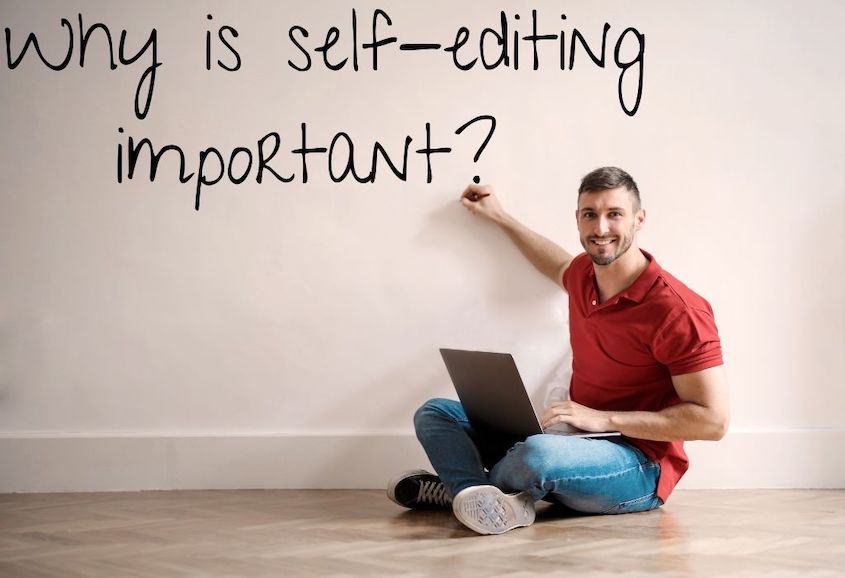
Self-editing is where you perform any type of edit on your own writing. The ultimate goal of self-editing your book is to improve it and make it more ‘readable’. This means ensuring the book conveys the story or message you want to share with the world, the way you want to say it, while being an engaging read.
Self-editing covers everything from a developmental review of the big-picture aspects (plot, structure, and characters, etc.) to tweaking words and punctuation, correcting grammar mistakes, and honing your word choice and sentence structure.
Never underestimate the importance of self-editing your book. Editing allows you to deal with any issues in your manuscript and polish up your first draft. It also teaches you to look at your own work more objectively. This is a useful skill for any writer to have. And, the more you write, the more you’ll find yourself incorporating the lessons you learn into future drafts.
But, before you jump into self-editing your book, remember to let it ‘rest’ for a bit. Finishing a first draft can be an intense experience, so take a second to pat yourself on the back, then set aside your manuscript for a few weeks or months (if possible). This will give your brain a break and allow you to jump into self-editing with a more objective approach. In the meantime, read books in the same genre, outline your next project, or start checking out potential literary agents for later.
6 top tips for self-editing your book
Ready to get started? Here are some top tips for self-editing your book!

1. Do your first read-through
After taking a break from your manuscript of at least six weeks (preferably more), read through your book from start to finish. We also recommend changing the book’s formatting, including altering the font style and size. This tricks your brain into thinking you’re reading something completely new, which allows you to be more objective.
At this point, don’t worry too much about the little details like grammar and punctuation. Instead, focus on big picture issues. Look for plot holes, long passages or story details that don’t make sense or are unclear, and inconsistent details in the characters or the world. Keep a notebook on hand as you read and make notes as you go along.
2. Read aloud
Reading your work out loud is one of the best approaches to self-editing your book. Reading aloud triggers a different part of your brain and forces you to be more attentive. You’ll be able to tell more easily when sentences do or don’t work.
As a general rule of thumb, if you stumble over a sentence or it doesn’t quite make sense when you read it aloud, your readers will likely get stumped by it, too, which means you should rewrite it.
Reading your manuscript out loud is also an effective way to find out if your dialogue sounds natural or not. After all, your characters are technically ‘speaking’ the dialogue. It never hurts to see if it sounds realistic when spoken out loud by a real person!
3. Line editing
While line editing, also called copy-editing, is something a professional book editor can do, you should also aim to do it on your own during the early rounds of self-editing your book. Line editing is when you systematically work through your book, focusing on smaller edits such as spelling, typos, and grammar issues. You should also keep an eye out for cliché language, repeating words and phrases, and any inconsistencies on a sentence level. This is another part of self-editing your book where reading out loud can be incredibly useful for catching smaller mistakes!

4. Embrace the re-read
Self-editing your book takes time and patience. So, adjust your expectations; you shouldn’t assume you’ll get everything done quickly. In fact, the editing process can sometimes take longer than writing the book in the first place!
Instead, take your time self-editing and embrace the re-read. Do as many read-throughs as necessary. Whether you intend to query literary agents or self-publish, it’s more important to get the job done right than done fast.
5. Get someone else’s opinion
It’s always good to have as many objective opinions as possible when you’re self-editing your book. Beta readers and writing buddies can offer an objective POV and catch things that you may not notice or have missed.
While beta readers can be helpful, professional book editors are the ones who can truly get your manuscript query or publishing ready. Our professional editors at The Open Book Editor can perform a wide array of in-depth editing services. They’ll take your manuscript to the next level with developmental edits, copy-edits, and proofreading.
6. Make a list of repeat errors
It’s human nature to repeat our mistakes and you often have to make a conscious effort to avoid them. While self-editing your book, make notes on your most common mistakes. Chances are, you’ll make them again in the future. But, if you’re conscious of them you’re much more likely to catch and correct them as you go along. Over time you’ll make these mistakes less and less. You’ll also improve as a writer and the self-editing process will become much faster and easier the next time around.
Major issues to watch for when self-editing
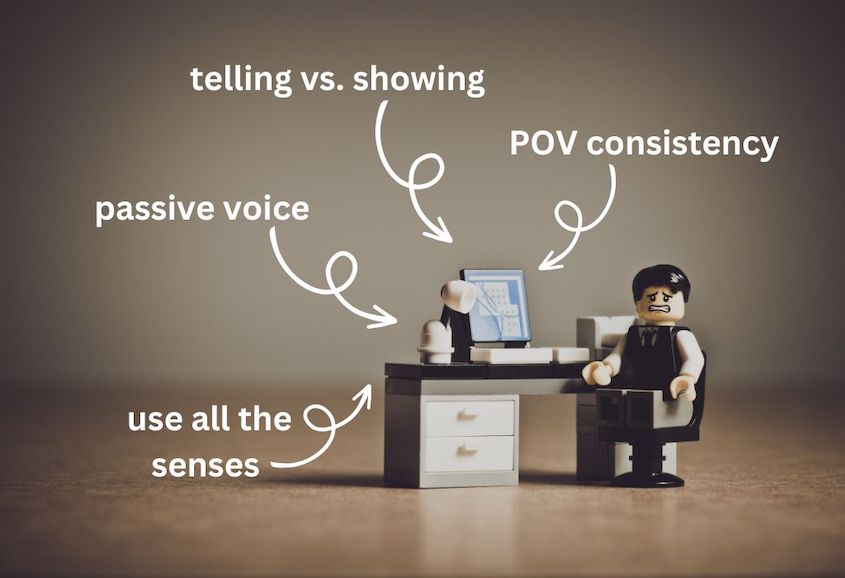
Telling instead of showing
One of the cornerstones of great writing is showing instead of telling. When self-editing your book, make sure you’re doing as much showing as possible and not telling your readers everything.
- Telling
- Simply state information without allowing your readers to draw their own conclusions.
- E.g. Jenny was cold.
- Showing
- Use strong verbs and specific details to paint a visual so your reader can come to their own conclusions.
- E.g. Jenny’s teeth chattered as she turned up her coat collar and wrapped her scarf tighter.
POV consistency
By the time you finish your first draft you should have a good idea of how many characters you need and what points of view you’re using. Watch out for POV inconsistencies such as switching POVs mid-chapter, not being consistent with first, second, or third-person POVs throughout your novel, or getting different POVs mixed up with the wrong characters.
Passive voice
While it’s not a hard rule, try to avoid using passive voice in your book as much as possible. Active voice is more engaging and pulls readers into your story more easily.
- Active voice
- Subject + Verb + Object
- The subject performs the action on the object.
- E.g: Mary ate the pasta.
- Passive voice
- Object + Verb + Subject
- The subject is being acted upon.
- E.g. The pasta was eaten by Mary.
Characters using all their senses
In order for them to be believable, your characters need to act like real people. They need to use all their senses (as opposed to just one or two) to seem believable, but to also fully absorb the reader into the story. When self-editing your book, pay attention to how your characters are reacting within each scene. How are they using their senses? Can they use their other senses to immerse the reader even more?
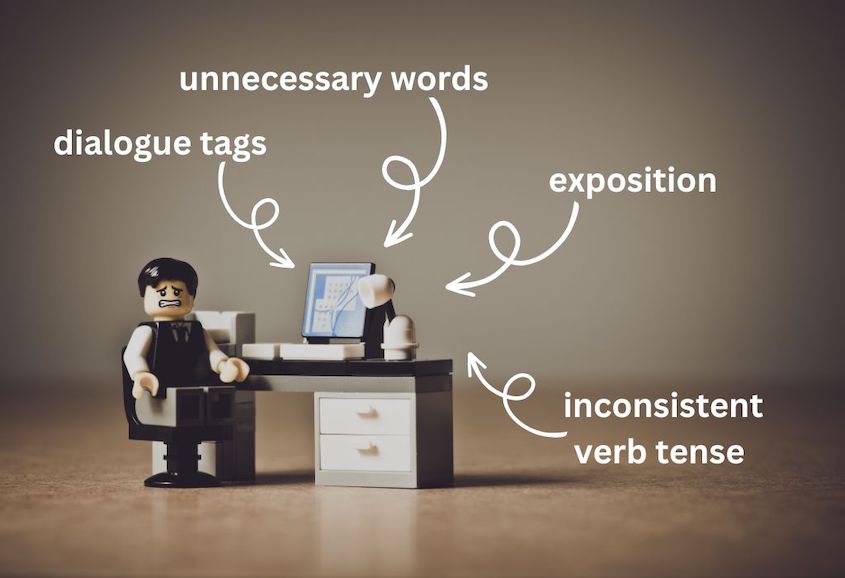
Unnecessary words
Just because you can use a word, it doesn’t always mean you should.
- Adverbs: Stephen King claims that the road to hell is paved with adverbs, but sometimes, it’s okay to use them. However, be careful about relying too heavily on adverbs. Great dialogue should make it easy for your reader to deduce how your characters are behaving or feeling without including unnecessary adverbs.
- Cliché words and phrases: It can be hard to avoid clichés, but you should make an effort to expunge these from your book while self-editing. You want your writing to stand out and clichés are clichés for a reason: because they’re overdone and predictable!
- Repeating words and phrases: Be careful about overusing the same word or phrase too often. This can feel redundant and distracting to readers (and remind them that they are reading a book). Look for the same sentence or phrases that you use several times throughout the book.
- Redundancies: Edit out redundant words and phrases. For example: ‘He blinked his eyes’ should be ‘He blinked’ (you can’t blink without eyes, hence ‘eyes’ is redundant) or ‘She trained in order to go to the Olympics’ should be ‘She trained to go to the Olympics’. These self-edits will tighten up your prose considerably.
Too many dialogue tags
If your scene is properly structured or there are conversations that happen between only a few characters, it’s possible for you to remove some/all dialogue tags. Too many dialogue tags clutter up the page or feel redundant. So, pay special attention to ways you can edit some of these out. For instance, use action to show us who is speaking.
Bill picked up the phone. “Should I order pizza or Chinese?”
“Whatever you want.” Sarah pulled the blanket over her raised legs. “But you’ve got to pay for it when it gets here.”
Remove exposition
While exposition can play an important role in some cases, you shouldn’t rely on it too much to carry your plot. Too much exposition (or info-dumping) can slow down your story or bore your reader with too much information. Instead of pages and pages of explanation about your world or characters, find creative ways to sprinkle this information throughout the book. Describe your world by showing how your characters live in and react to their environment. Or work information into your dialogue. This is one of the best ways to use effective exposition so you don’t overload your reader.
Inconsistent verb tense
Inconsistent verb tenses are a sure way for your writing to sound amateurish. Be clear about what tense you’re using in your book and check that it’s consistent throughout. Keep in mind that verb tense can vary according to genre and you should use the tense that most effectively tells your story. For example, thrillers generally use present tense to increase tension, while historical fiction or memoirs often employ the past tense.
What if I still need help editing?
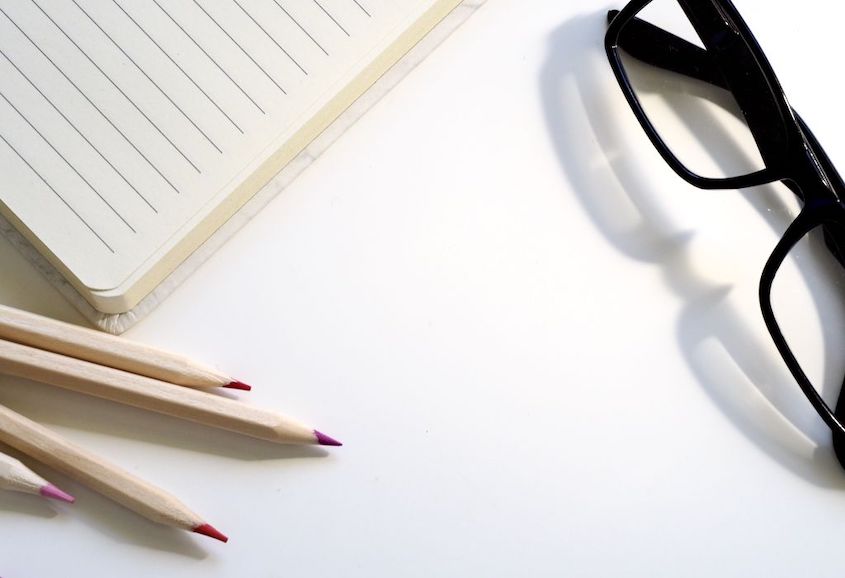
AI can be a great editing tool for writers, and one you can access for free. However, make sure you’re aware of its limitations and inconsistencies. AI currently doesn’t have the same capabilities a human editor does (it will often miss errors or even introduce new ones). You can also find some amazing, supportive online writing communities through subreddits like r/writing and r/selfpublish. NaNoWriMo holds writing events throughout the year, and their website is another great place to find fellow writers in your local community.
But sometimes writing can still seem a bit like feeling your way through a dark cave, can’t it? It’s hard to see the final result when you’re in the thick of writing or self-editing. But it’s completely normal to need a little extra help with the editing process—even after several rounds of self-editing your book! Think of our author coaching as a flashlight to help you on your way. Our aim is to provide you with useful tools and a solid writing foundation. We’ll help guide you in the right direction through writing assessments, skill development, and personalised writing advice.
Remember: the key to writing (and publishing) a great book is a solid writing community around you—whether it be writing buddies, a passionate professional editor, or a writing coach!
